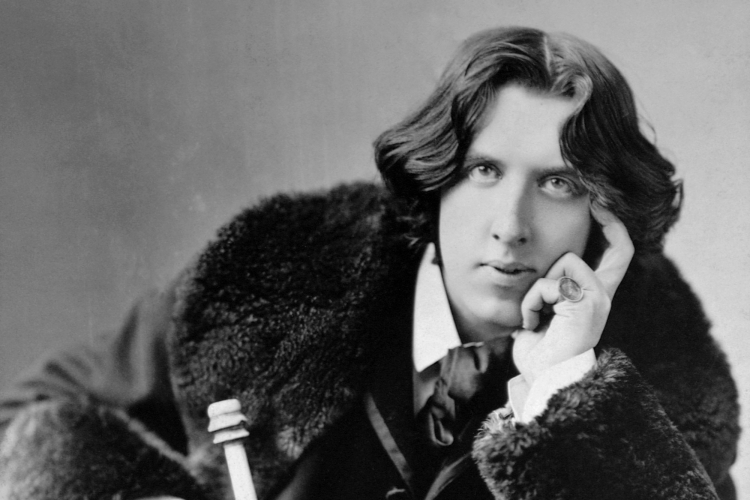Insolence Incarnate: A Wilde Exhibition

Paris has long been a place of refuge for rebellious artists. Ernest Hemingway, F. Scott Fitzgerald, and John Dos Passos (to name a few) are all familiar examples of the ex-pat artistic set who lived, worked, and loved in the city of light. It perhaps comes as no surprise, then, that Oscar Wilde–arguably the most decadent author and playwright to come out of the nineteenth century–famously declared, "France gave me asylum."
Cartoon depiction of Wilde by Thomas Nast, Harper's Bazaar, June 10, 1882. Image Credit: Denver Public Library Digital CollectionsA known Francophile, Wilde spoke fluent French, even writing and presenting his acclaimed play Salomé in the language. Insolence Incarnate, the new exhibition at the Petit Palais, serves as a homecoming of sorts for the Irish-born Wilde, a fitting tribute to a man who lived out his final days in Paris and is currently buried in the Cimetière du Père Lachaise.
Oscar Wilde's grave in Père Lachaise cemetery, covered in kisses from adoring fans. Image Credit: Amusing PlanetThe exhibition offers a wonderfully detailed look into both Wilde's personal life and his oeuvre, with over 200 exhibits of manuscripts, photographs, drawings, caricatures and personal effects on display. The reason the exhibition has been gaining so much buzz–and why I queued in line for almost an hour outside the Petit Palais despite already possessing a ticket–is that there has never before been a Wilde show in France, despite his intrinsic ties to the country.
Interior of fine arts museum Petit Palais. Image Credit: Petit Palais"[Wilde] has always been quite highly revered in France," explains Merlin Holland, Wilde's grandson and co-curator of the exhibition. "A lot of the French press, at the time of his trials, wrote in his defense, saying it was shameful to treat an artist in this way."
The infamous 1897 trial in England, wherein Wilde was sentenced to two years in jail for "gross indecency" with another man, is not glossed over in the exhibition. Conversely, Insolence Incarnate fully embraces the scandals and notoriety that colored the writer's too-short life. Portraits and photographs taken by close members of Wilde's inner circle abound, offering an intimate look into the glittery life he lived before his arrest. Paintings by famed Parisian painter Toulouse-Lautrec and a photo-portrait series by Napoleon Sarony present Wilde at the height of his dandyism, as an aesthete whose penchant for parties, liquor and beautiful clothes defined a new and emerging type of celebrity.
La Danse Mauresque by Toulouse-Lautrec. Image Credit: The TelegraphThe exhibition also features a portrait of Wilde's lover, Lord Alfred Douglas (affectionately known by Wilde as "Bosie"), whom he met shortly after writing his only novel, The Picture of Dorian Grey. Bosie was both the love of Wilde's life and his muse, and the exhibition offers a glimpse into their torrid love affair; also shown are correspondences with Wilde's wife Constance both during and after the affair, charting the path of their difficult love triangle. Wilde's correspondences with his close friend and confidant Robbie Ross, also on display, underscore Wilde's tragic love story: in one letter featured, he writes of Bosie: "The mere fact that he wrecked my life makes me love him."
Les Deux Magots café, a frequent haunt of Wilde's in the last years of his life. Image Credit: Paris Through New EyesAlthough Wilde's final years, in which he was sentenced to hard labor in prison and then consequently exiled to France, were a tragically unfitting end to his glamorous life, this exhibition underlines the small comfort Paris gave him up until his death at L'Hôtel in 1900. It's a fitting tribute to a man who famously wrote: "When good Americans die, they go to Paris."
Oscar Wilde: Insolence Incarnate will be showing at the Petit Palais until Jan. 15, 2017.












